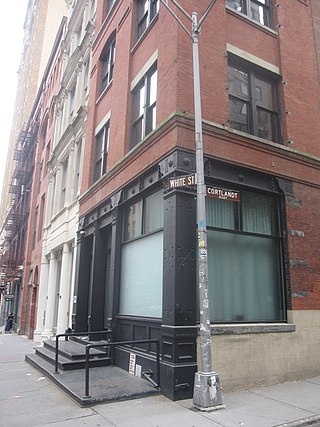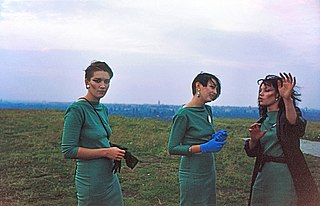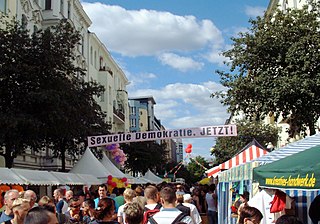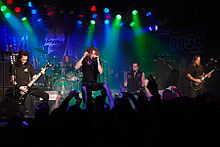Chicago house refers to house music produced during the mid to late 1980s within Chicago. The term is generally used to refer to the original house music DJs and producers from the area, such as Ron Hardy and Phuture.

CBGB was a New York City music club opened in 1973 by Hilly Kristal in the East Village in Manhattan, New York City. The club was previously a biker bar and before that was a dive bar. The letters CBGB were for Country, Bluegrass, Blues, Kristal's original vision for the club. But CBGB soon emerged as a famed and iconic venue for punk rock and new wave bands, including Ramones, Dead Boys, Television, Patti Smith Group, Blondie, Madonna and Talking Heads.

Kreuzberg is a district of Berlin, Germany. It is part of the Friedrichshain-Kreuzberg borough located south of Mitte. During the Cold War era, it was one of the poorest areas of West Berlin, but since German reunification in 1990, it has become more gentrified and is known for its arts scene.

Prenzlauer Berg is a locality of Berlin, forming the southerly and most urban district of the borough of Pankow. From its founding in 1920 until 2001, Prenzlauer Berg was a district of Berlin in its own right. However, that year it was incorporated into the greater district of Pankow.
Danceteria was a nightclub that operated in New York City from May 1980 until 1986 and in the Hamptons until 1995. The club operated in various locations over the years, a total of three in New York City and four in the Hamptons. The most famous location was the second, a four-floor venue at 30 West 21st Street in Manhattan that served as the location for the disco scene in the film Desperately Seeking Susan.

Underground music is music with practices perceived as outside, or somehow opposed to, mainstream popular music culture. Underground styles lack the commercial success of popular music movements, and may involve the use of avant-garde or abrasive approaches. Underground music may be perceived as expressing sincerity and creative freedom in opposition to those practices deemed formulaic or market-driven. Notions of individuality and non-conformity are also commonly deployed. The term has been applied to artists in styles such as psychedelia, punk, alternative rock, electronica, industrial music, and wider strains of experimental music.

The Mudd Club was a nightclub located at 77 White Street in the TriBeCa neighborhood of Lower Manhattan in New York City. It operated from 1978 to 1983 as a venue for post punk underground music and no wave counterculture events. It was opened by Steve Mass, Diego Cortez and Anya Phillips.

Berghain is a nightclub in Berlin, Germany. It is named after its location near the border between Kreuzberg and Friedrichshain, and is a short walk from Berlin Ostbahnhof main line railway station. Founded in 2004 by friends Norbert Thormann and Michael Teufele, it has since become one of the world's most famous clubs and has been called the "world capital of techno."
German punk includes a body of music and a subculture that have evolved since punk rock became popular in Germany in the 1970s. Within the subculture of punk in Germany, a style of music called Deutschpunk was developed; this style of music has developed distinctly from hardcore punk, and includes lyrics in German as well as a fast tempo. In the punk scene in Germany, some bands play music in the Deutschpunk style, while other German punk bands pursue various other styles of punk music.
German electronic music is a broad musical genre encompassing specific styles such as Electroclash, trance, krautrock and schranz. It is widely considered to have emerged in the late 1960s and early 1970s, becoming increasingly popular in subsequent decades. Originally minimalistic style of electronic music developed into psychedelic and prog rock aspects, techno and electronic dance music. Notable artists include Kraftwerk, Can, Tangerine Dream and Deutsch Amerikanische Freundschaft. German electronic music contributed to a global transition of electronic music from underground art to an international phenomenon, with festivals such as Love Parade, Winterworld and MayDay gaining prominence alongside raves and clubs.
Neco Çelik is a Turkish-German filmmaker.

A nightclub is a club that is open at night, usually for drinking, dancing and other entertainment. Nightclubs often have a bar and discothèque with a dance floor, laser lighting displays, and a stage for live music or a disc jockey (DJ) who mixes recorded music. Nightclubs tend to be smaller than live music venues like theatres and stadiums, with few or no seats for customers.

Mania D was a German Neue Deutsche Welle underground band at the end of the seventies to the beginning of the eighties in West Berlin. They had been part of the Geniale Dilettanten movement. Members were the predecessors of the all-girls band Malaria!, of Liaisons Dangereuses, Einstürzende Neubauten, Die Krupps. Their music unified elements of free jazz with those of new wave by a distinctive saxophone sound.

Berlin is recognized as a world city of culture and creative industries. Numerous cultural institutions, many of which enjoy international reputation are representing the diverse heritage of the city. Many young people, cultural entrepreneurs and international artists continue to settle in the city. Berlin has established itself as a popular nightlife and entertainment center in Europe.

Paul-Lincke-Ufer is a street in Berlin running along the Landwehr Canal in the Kreuzberg quarter of the city. The street runs from Kottbusser Brücke all the way to the Treptow Canal. Opposite it is the Maybach Ufer where the Turkish Market takes place on Tuesday, Friday and some Saturdays.
Adele Maria Bertei is an American singer, songwriter, writer, and director.

Berlin Atonal is an annual festival for sonic and visual art in two distinct stages. It first took place between 1982 and 1990, relaunching in 2013 under new direction and continuing to the present day. The festival presents contemporary, interdisciplinary projects at the intersection of sound art, visual and media art, installation and performance, with an emphasis on commissioned work and world premieres.
Boris Policeband was a no wave noise music performer who used dissonant violin, police radio transmissions, and voice. Boris Pearlman was a classically trained violist from New York City.

Berlin was the capital city of the German Empire from 1871 to 1945, its eastern part the de facto capital of East Germany from 1949 to 1990, and has been the capital of the unified Federal Republic of Germany since June, 1991. The city has an active LGBTQ community with a long history. Berlin has many LGBTIQ+ friendly districts, though the borough of Schöneberg is widely viewed both locally and by visitors as Berlin's gayborhood. Particularly the boroughs North-West near Nollendorfplatz identifies as Berlin's "Regenbogenkiez", with a certain concentration of gay bars near and along Motzstraße and Fuggerstraße. Many of the decisive events of what has become known as Germany's second LGBT movement take place in the West Berlin boroughs of Charlottenburg, Schöneberg, and Kreuzberg beginning in 1971 with the formation of the Homosexuelle Aktion Westberlin (HAW). Whereas in East Berlin the district of Prenzlauer Berg became synonymous with the East Germany LGBT movement beginning in 1973 with the founding of the HIB. Schöneberg's gayborhood has a lot to offer for locals and tourists alike, and caters to, and is particularly popular with gay men.

Live at SO36 is the 6th live album of the German pop singer Nena. It comprises the recording of most of her concert performed at the SO36 club in Berlin on 4 March 2015 and was released exactly one year later on 4 March 2016.














